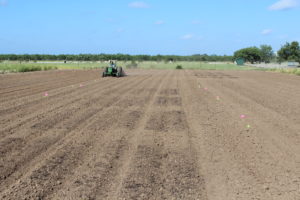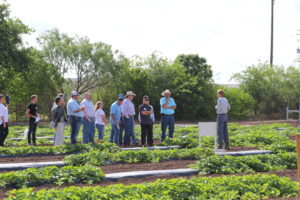Summary
Current Research
- Seed and transplant physiology: Impact in onion establishment
- Soil amendments and health: Applications on plants and soil-biota growth
- Tomato grafting: High tunnel and field production systems
- Organic systems: Soil health and phytochemicals in globe artichoke
- Hydroponics: Water and nitrogen management for leafy vegetable
- Genetic × Environment × Management (G×E×M) for stress tolerance, yield, and quality
Maximizing crop yield, quality and resource use efficiency in water limited areas and less fertile soils are major challenges under the increasing population, intense farming practices and climate change of south Texas. The Vegetable Physiology research program aims at understanding plant adaptation mechanisms to abiotic stresses (water limitation, drought and heat stress) and in developing sustainable cropping systems for high-value crops.
Seed and transplant physiology: Impact in onion establishment
Plant growth regulators (PGRs) can positively regulate seed germination and/or root growth and development. Research in onion seeds showed the PGR ethephon, to be beneficial in increasing seedling root surface area but reduced root length. Hydro-priming was shown to be a simple and viable method to enhance onion germination and root traits. A follow-up study aimed at selecting the best transplant strategies to improve onion crop performance. The impact of later planting dates and seedling densities in the trays were evaluated on growth, yield components, bulb quality and phytonutrient content of three onion cultivars (‘Caramelo’, yellow; ‘Don Victor’, yellow; and ‘Lambada,’ red). Our results demonstrated that the technique of establishing onion transplants grown from 1 or 3 seeds per cell in a tray from early November to early December provides a practical and economical alternative to achieve earlier crops while reducing the length of the production season.
Soil amendments and health: Applications on plants and soil-biota growth

Organic matter-derived soil amendments containing humic substances (HS) have a functional role in improving plant growth and soil quality. A recent study assessed the impact of lignite-derived HS on biota growth and evaluated their potential mitigative effects under water deficit stress in bell pepper plants grown in sandy and clay soil previously mixed with HS. Our results showed that HS increased plant root development and soil bacteria population in moderate and no stress conditions (60%, 80% water holding capacity). Physiologically, HS rapidly decreased leaf stomatal conductance and transpiration (reducing water loss) after imposing severe or mild stress (20%, 40%). Due to their capacity to improve plant root growth, soil nutrient cycling, and microbial activity, application of HS may have long-term benefits in agricultural systems. A follow-up HS study using path analysis distinguished abiotic factors that affected the rhizosphere microbial biomass in a bell pepper system. This study can be a reference to establish applied approaches to improve the persistence and benefits from rhizosphere microbial communities.
Tomato grafting: High tunnel and field production systems

Successful integration of tomato grafting with high tunnels (HT) could open new opportunities for the Texas tomato industry by using vigorous rootstocks for effectively managing soil diseases, abiotic stresses, and improve fruit quality and yield. Multilocation trials were conducted to evaluate the yield performance of grafted tomatoes in HT and open-field (OF) environments. Overall the HT system enhanced marketable yields by 116-161% relative to OF systems, with an additional 8-23% increase due to grafting adapted cultivars with interspecific rootstocks. Results from these studies demonstrated that grafting along with a protected environment system clearly has the potential to significantly increase tomato profitability. Current studies are focused on:
- Nutritional fruit quality such as sugars and antioxidant metabolites
- Root traits in commercial and TAMU rootstocks under water and nitrogen deficit
- Biochemical basis of drought tolerance in wild tomato accessions (Solanum pennellii, S. peruvianum S. habrochaites)
- Quality of grafted transplants based on enhanced root growth.
Organic Systems: Soil Health and Phytochemicals in Globe Artichoke

Soil amendments using organic fertilizers are widely used to dispose of animal waste, reduce environmental pollution and improve soil and fruit quality. A new study assessed the influence of plant- and animal-based soil amendments on soil nutrient availability, CO2 respiration (soil health indicator), yield and phytochemicals of artichoke (Cynara cardunculus cv. 179) heads. After two years of organic soil amended with plant-based fertilizer (alfalfa meal), soil respiration and content of organic matter (OM) was higher than when using animal-based fertilizers (fish meal, blood meal, and chicken manure). Conversely, marketable yield from soil amended with chicken manure and a fish meal was higher but with heads having less concentration of phytochemicals than those modified with alfalfa meal. Plant-based fertilizer can be an ideal option to improve soil and head quality of artichokes, but animal-based sources might be an appropriate choice for organic farmers when yield and cost are the main concerns. A second study also assessed the influence of organic and conventional production systems on growth, yield, quality and soil chemical properties of 7 artichoke cultivars. Overall the open pollinated cv. Imperial Star had the lowest yield and head quality. Plants grown in a conventional field have higher growth, physiological responses, and returns in comparison with an organic field; however, the latter produced higher quality artichoke heads with an increase in chlorogenic acid by 31% and cynarin by 12%. Notably, soil respiration-CO2 in the organic field increased by 20-fold compared to the conventional field. Our study suggests that organic farming was the best system to improve soil and artichoke head quality, but it may not be the best option for farmers when yield is the primary target short-term.
Hydroponics: Water and Nitrogen Management for Leafy Vegetables

Understanding growth, water use, N-nutrient uptake, and utilization is a prerequisite to effectively managing irrigation and fertilization programs in any cropping system including leafy vegetables in hydroponic systems. Earlier studies demonstrated the significant water savings (up to 90%) of lettuce cultivars grown in hydroponics versus open field cultivation under drip or center pivot systems. In a recent follow-up N-nutrition study we concluded that a pre- and post-transplant nutrient solution of up to 150 mg L−1 N was sufficient to ensure optimal growth and maximum yield of lettuce cultivars. Following the management strategies selected for Romaine and Bibb lettuce types, on-going studies are targeted to screen and select leafy Asian vegetables.
 Genetic × Environment × Management (G×E×M) for Stress Tolerance, Yield and Quality
Genetic × Environment × Management (G×E×M) for Stress Tolerance, Yield and Quality
In conjunction with breeders, projects are focused on high-value vegetables such as fresh-market tomato and specialty melons rich in nutrients, vitamins and antioxidants, compounds important for human health. We are integrating production strategies with new soil, and canopy sensing methods to screen and select superior germplasm with potential for abiotic/biotic stress tolerance, high nutrition and adapted to hot and water-limited environments. The goal is to design specific cultural practices for new ‘branded products’ for growers, with the hope to create new opportunities to increase market share in Texas. Genotypic traits of interest are high root vigor, improved canopy growth, high fruit set, earliness, pest and disease resistance, water use efficiency, high flavonoids, carotenoids, vitamin C and sugars.
Dr. Daniel Leskovar
Team Members
- Joshua Harvey, Research Associate
- Seunghyun Choi, Ph.D. Postdoctoral Research Associate
- Carrie Hensarling, Research Associate
- Manuel Pagan, Research Specialist I
- Chungkeun Lee, PhD Student
- Asmita Nagila, PhD Student
- Asmita Sharma, MS Student
- Juan Hernandez, Program Aide
- Diego Garcia, Non-affiliated Student Worker
- Desiree Stalbird, Non-affiliated Student Worker
Publications
Recent Related Publications (2024-2019)
- *Lee, C., Harvey, J.T., *Qin, K., V. Joshi, and D.I. Leskovar. 2024. Exploring the potential of Solanum pennellii and Solanum peruvianum as rootstocks for enhancing thermotolerance of tomato plants. Environmental and Experimental Botany, Volume 221, May 2024, 105741. https://doi.org/10.1016/j.envexpbot.2024.105741
- Leskovar, D.I. and *Qin, K. 2024. A comprehensive analysis and scientific impact of ASHS cross-commodity publication awards. HortTechnology 34(3), 292-300. https://doi.org/10.21273/HORTTECH05363-23
- *Bhattarai, S.; Harvey, J.T.; *Lee, C.; Joshi, V. and D.I. Leskovar. 2024. Assessment of physiological and biochemical thermotolerance traits in tomato genotypes. Scientia Horticulturae, Vol 324, 112561. https://doi.org/10.1016/j.scienta.2023.112561
- §Dash, P.K., Guo, B. and D.I. Leskovar. 2024. Assessing tomato genotypes for organic hydroponic production in stressful environmental conditions. HortScience, 59(2):188-200. https://doi.org/10.21273/HORTSCI17481-23
- *Lee, C., Harvey, J.T., *Nagila, A., *Qin, K., and D.I. Leskovar. 2023. Thermotolerance of tomato plants grafted onto wild relative rootstocks. Front. Plant Sci., Sec. Plant Abiotic Stress. Volume 14 – 2023 https://doi.org/10.3389/fpls.2023.1252456
- §Dash, P.K., Guo, B. and D.I. Leskovar. 2023. Optimizing hydroponic management practices for organically grown greenhouse tomato under abiotic stress conditions. HortScience. 58(10):1129-1138. https://doi.org/10.21273/HORTSCI17249-23
- Niyakan, S., Nagashima, Y., Singh, J., Metrani, R., Crosby, K.M., Jifon, J., Jayaprakasha, G.K., Ravishankar, S., Brierley, P., Leskovar, D.I., Turini, T.A., Schultheis, J., Coolong, T., Guan, W., Miller, R., Patil, B., Qian, X., and H. Koiwa. Genetic and geographical inputs that shape metabolomic and transcriptomic profiles of melon fruits. Scientia Horticulturae, Vol 321, 112337. https://doi.org/10.1016/j.scienta.2023.112337
- Crosby, M., Marquez. S., Jifon, J., Leskovar, D., Singh, J. and B. Patil. 2023. Supermelon and flavorific: two new hybrid muskmelon cultivars with resistance to Monosporascus cannonballus from Texas A&M AgriLife Research. HortScience. 58(7): 804-807. https://doi.org/10.21273/HORTSC117116-23
- *Qin., K., Harvey, J.T., *Lee, C., and D.I. Leskovar. 2023. Substrate amended with solid humic substances improved Micro-Tom tomato growth. European Journal of Horticultural Science, 88(5) https://doi.org/10.17660/eJHS.2023/030
- *Qin., K., Dong, X., and D.I. Leskovar. Improving tomato nitrogen use efficiency with lignite-derived humic substances. Scientia Horticulturae, Vol 321, 112243 https://doi.org/10.1016/j.scienta.2023.112243
- *Lee, C., Harvey, J.T., *Qin, K., and D.I. Leskovar. 2023. Physio-biochemical responses of grafted tomatoes differing in thermotolerance to heat stress and recovery. Scientia Horticulturae, Vol 308, 1111546 https://doi.org/10.1016/j.scienta.2022.111546
- Metrani, R., Singh, J., Jayaprakasha, G.K., Crosby, K.M., Jifon, J.L., Ravishankar, S., Brierley, P.E., Leskovar, D.I., Turini, T.A., Schultheis, J., Coolong, T., Guan, W., Patil, B.S. 2023. Multi-location evaluation of cantaloupe (Cucumis melo L.) cultivars for their aroma and flavor related volatile composition using a metabolomics approach. Food Chemistry Advances https://doi.org/10.1016/j.focha.2023.100223
- Dong, X. Feng, G., Sieckenius, and D.I. Leskovar. 2023. Effect of mustard cover crops on corn growth, yield and soil water storage in southwest Texas. Arid Land Research and Management https://doi.org/10.1080/15324982.2022.2130114
- Mancini, M., Breso,A., Rúa, F., Lanza Volpe, M., Leskovar, D., and V. Cravero. 2023. Biomass characterization of wild and cultivated cardoon accessions and estimation of potential biofuels production. Biomass Conv. Bioref. https://doi.org/10.1007/s13399-023-03784-y
- Singh J., Metrani R., Jayaprakasha G.K., Crosby K.M., Jifon J.L., Ravishankar S., Brierley P., Leskovar D. I., Turini T.A., Schultheis J., Coolong T., Guan W., Patil B.S. 2022. Profiling carotenoid and sugar contents in unique Cucumis melo L. cultigens harvested from different climatic regions of the United States. Journal of Food Composition and Analysis; https://doi.org/10.1016/j.jfca.2021.104306
- §Othman, Y.A. and D.I. Leskovar. 2022. Foliar application of gibberellic acid improves yield and head phenolic compounds in globe artichoke. Scientia Horticulturae 301. https://doi.org/10.1016/j.scienta.2022.111115
- §Othman, Y.A. and D.I. Leskovar. 2022. Degradable mulch as an alternative to polyethylene for watermelon production. HortTechnology 32:2. https://doi.org/10.21273/HORTTECH04997-21
- *Alves, FM, Joshi, M, §Djidonou, D, Joshi, V, Gomes, NI and DI Leskovar. Physiological and biochemical responses of tomato plants grafted onto solanum pennellii and solanum peruvianum under water-deficit conditions Plants 2021, 10(11), 2236; https://doi.org/10.3390/plants10112236
- §Joshi, M, Leskovar, D, §Djidonou, D, Jifon, J, Avila, C, Masabni, J and K Crosby. Production systems and growing environments had stronger effects than grafting on the nutritional quality of tomato. ACS Food Science & Technology. 2021. 1 (8), 1399-1411 DOI: 10.1021/acsfoodscitech.1c00051
- Niu, G.; Masabni, J.; Hooks, T.; Leskovar, D.; Jifon, J. The performance of representative Asian vegetables in different production systems in Texas. Agronomy 2021, 11, 1874. https://doi.org/10.3390/agronomy11091874
- Dong X, Peng B, Sieckenius S, Raman R, Conley MM, Leskovar DI. 2021. Leaf water potential of field crops estimated using NDVI in ground-based remote sensing—opportunities to increase prediction precision. PeerJ 9:e12005 https://doi.org/10.7717/peerj.12005
- *Bhattarai, S.; Harvey, J.T.; §Djidonou, D.; Leskovar, D.I. 2021. Exploring morpho-physiological variation for heat stress tolerance in tomato. Plants 2021, 10, 347. https://doi.org/10.3390/plants10020347
- Leskovar, D.I.; §Othman, Y.A. Direct Seeding and Transplanting influence root dynamics, morpho-physiology, yield, and head quality of globe artichoke. Plants 2021, 10, 899. https://doi.org/10.3390/plants10050899
- Khasawneh, A.E.R., N. Alsmairat, Y.A. §Othman, J.Y. Ayad, T. Al-Qudah & D.I. Leskovar. 2021. Influence of nitrogen source on physiology, yield and fruit quality of young apricot trees. Journal of Plant Nutrition, DOI: 10.1080/01904167.2021.1918718
- *Qin, K., and D.I. Leskovar. 2020. Humic substances improve vegetable seedling quality and post-transplant yield performance under stress conditions. Agriculture, 10, 254. https://doi.org/10.3390/agriculture10070254.
- §Djidonou, D., Leskovar, D.I., Joshi, M. et al. 2020. Stability of yield and its components in grafted tomato tested across multiple environments in Texas. Sci Rep 10, 13535. https://doi.org/10.1038/s41598-020-70548-3
- Tahat, M.M, Alananbeh, K.M., §Othman, Y., and D. Leskovar. 2020. Soil health and sustainable agriculture. Sustainability 2020, 12(12), 4859; https://doi.org/10.3390/su12124859
- Sharma, S.P., Leskovar, D.I., Crosby, K.M. and A.M.H. Ibrahim. 2020. GGE biplot analysis of genotype-by-environment interactions for melon fruit yield and quality traits. HortScience 55:533-542. https://doi.org/10.21273/HORTSCI14760-19
- Singh, D., Leskovar, D.I., Sharma, S.P. et al. 2020. Genetic diversity and interrelationship among Indian and exotic melons based on fruit morphology, quality components and microsatellite markers. Physiol Mol Biol Plants 26, 985–1002. https://doi.org/10.1007/s12298-020-00814-1
- Qin, K. and D.I. Leskovar. 2020. Assessments of humic substances application and deficit irrigation in triploid watermelon. HortScience 55:716-721. https://doi.org/10.21273/HORTSCI14872-20
- Peng, B., Liu, X., Dong, X., Xue, Q., Neely, C.B., Marek, T., Ibrahim, A.M.H., Zhang, G., Leskovar, D.I., and J.C. Rudd 2019. Root morphological traits of winter wheat under contrasting environments. J Agro Crop Sci. 205: 571– 585. https://doi.org/10.1111/jac.12360
- Yoo, K.S., Leskovar, D., Patil, B.S. and E.J. Lee. 2019. Effects of leaf cutting on bulb weight and pungency of short-day onions after lifting the plants. Scientia Horticulturae, 257. https://doi.org/10.1016/j.scienta.2019.108720
- Qin, K. Dong, X., Jifon, J. and D.I. Leskovar. 2019. Rhizosphere microbial biomass is affected by soil type, organic and water inputs in a bell pepper system. Applied Soil Ecology 138, 80-87. https://doi.org/10.1016/j.apsoil.2019.02.024
- Djidonou, D. and D.I. Leskovar. 2019. Seasonal changes in growth, nitrogen nutrition, and yield of hydroponic lettuce. HortScience 54:76-85. https://doi.org/10.21273/HORTSCI13567-18
- Macias-Leon, M. A. and D.I. Leskovar. 2019. Containerized onion transplant: Management systems to enhance growth, yield and quality. HortScience 54:60-69. https://doi.org/10.21273/HORTSCI13438-18
- Dong, X., Peng, B., Liu, X., Qin, K. Xue, Q. and D.I. Leskovar. 2019. An automated calculation of plant root distribution parameters based on root length density data. Applied Ecology & Environmental Research, 17: 3545-3552.
- Othman, Y.A. and D. I. Leskovar. 2019. Nitrogen management influenced root length intensity of young olive trees. Scientia Horticulturae 246, 726-733. https://doi.org/10.1016/j.scienta.2018.11.052
- Leskovar, D.I. and Othman. 2019. Nitrogen management for improving root and shoot components of young ‘Arbequina’ olives. HortScience 54:175-180. https://doi.org/10.21273/HORTSCI13397-18
- Sharma, S.P., D.I. Leskovar and K.M. Crosby. 2019. Genotypic differences in leaf gas exchange and growth responses to deficit irrigation in reticulatus and inodorus melons (Cucumis melo L.). Photosynthetica 57. DOI: 10.32615/ps.2019.022.
- Liu, X., Feakins, S.J., Dong, X., Xue, Q., Han, J., Marek, T., Leskovar, D.I., Neely, C.B. and A.M.H. Ibrahim. 2019. Evaluating Leaf Wax and Bulk Leaf Carbon Isotope Surrogates for Water Use Efficiency and Grain Yield in Winter Wheat. Crop Science, 59: 718-732. doi:10.2135/cropsci2018.07.0452
- Mancini, M., Lanza Volpe., M., Gatti, B., Malik, Y., Moreno, A.C. Leskovar, D.I. and V. Cravero. 2019. Characterization of cardoon accessions as feedstock for biodiesel production. Fuel 235:1287-1293. https://doi.org/10.1016/j.fuel.2018.08.123



